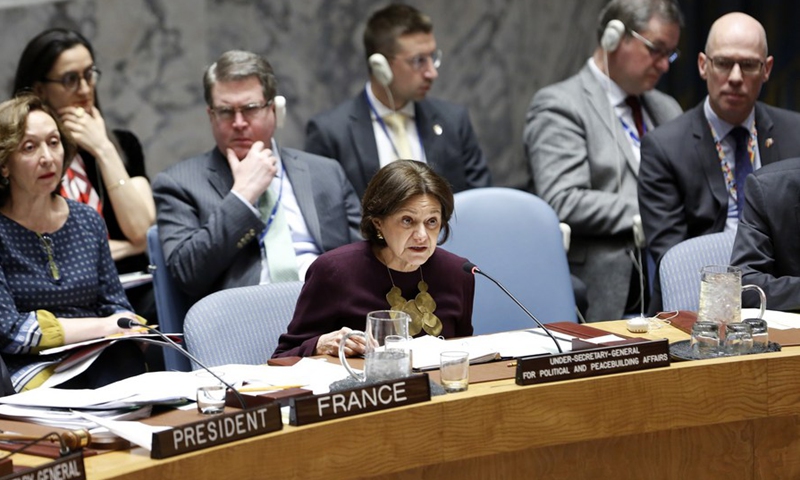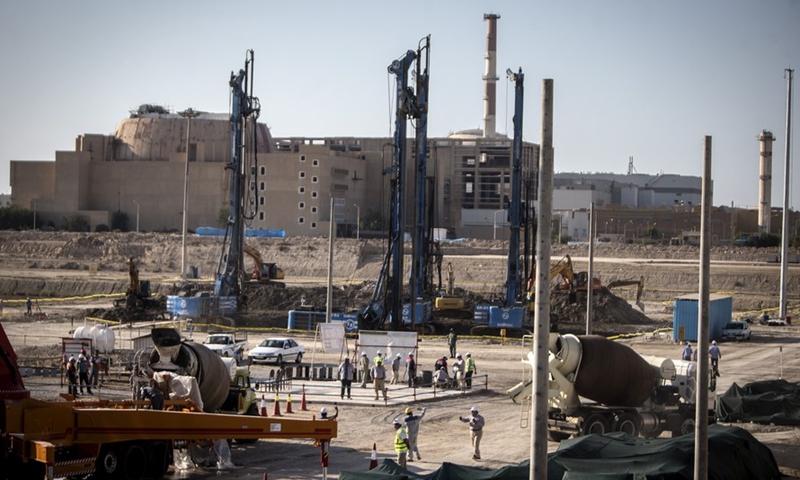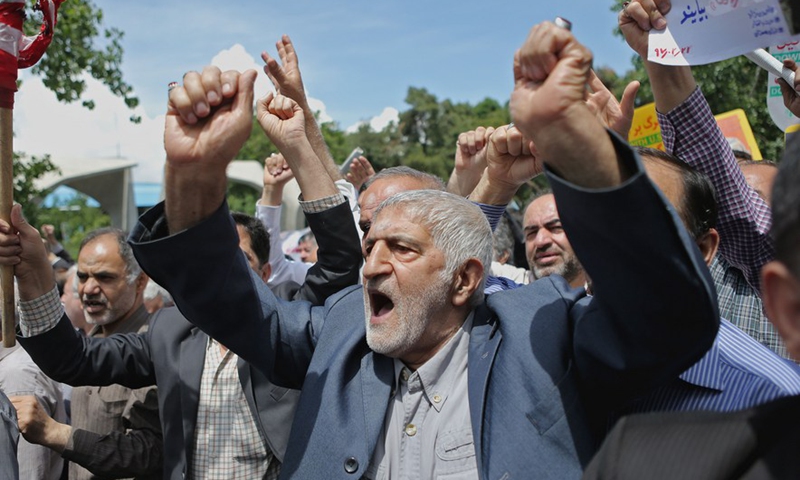
Rosemary DiCarlo (front), United Nations undersecretary-general for political and peacebuilding affairs, addresses a Security Council meeting on the situation in the Middle East (Syria), at the UN headquarters in New York, March 27, 2019. (Xinhua/Li Muzi)
UN Undersecretary-General for Political and Peacebuilding Affairs Rosemary DiCarlo on Tuesday called for efforts to preserve the Iran nuclear deal.
"The Iranian nuclear issue is an important non-proliferation subject, with consequences for regional and global peace and security. In achieving the JCPOA, the concerned countries had shown that their dialogue and diplomacy, supported by a united Security Council, could forge a path to resolving this issue. We hope that these countries and the council can do so again," said DiCarlo, using the initials of the official name of the Iran nuclear deal.
UN non-proliferation efforts seek to prevent the spread of nuclear weapons and technology, to promote cooperation in the peaceful uses of nuclear energy, and to further the goal of achieving nuclear disarmament. These efforts have a bearing on the prevention and peaceful resolution of conflict at both regional and international levels. Full implementation of Joint Comprehensive Plan of Action (JCPOA) and Security Council Resolution 2231, which endorsed the deal, can contribute to regional stability, she told the Security Council in a briefing.
Regrettably, however, regional tensions have increased. The last several years witnessed attacks on critical infrastructure, heated rhetoric and the heightened risk of miscalculation, she said.
"Such actions deepen the differences related to the plan and render efforts to address other regional conflicts more difficult. We call on all concerned to avoid any actions that may result in further escalation of tensions."

Laborers work at the construction site of the second phase of Iran's Bushehr Nuclear Power Plant in Bushehr, southern Iran, on Nov. 10, 2019. (Photo by Ahmad Halabisaz/Xinhua)
UN Secretary-General Antonio Guterres has consistently underscored the importance of the JCPOA and has encouraged all states to support it. He also believes that Iran should address concerns raised about its activities in relation to the restrictive measures, she noted. "As we have stated before, issues not directly related to the plan should be addressed without prejudice to preserving the agreement and its accomplishments."
The United Nations regrets the steps taken by the United States since May 2018 when it withdrew from the deal, as well as the steps taken by Iran since July 2019 to reduce some of its nuclear-related commitments under the deal, said DiCarlo.
The re-imposition by the United States of all its unilateral sanctions that had been lifted or waived pursuant to the deal is contrary to the goals set out in the deal and in Resolution 2231. Steps taken by the United States not to extend waivers for the trade in oil with Iran and certain non-proliferation projects may have impeded the ability of Iran and other member states to implement certain provisions, she said.

People chant slogans in a protest to condemn U.S. withdrawal from the 2015 Iran nuclear deal in Tehran, Iran, on May 11, 2018. (Xinhua/Ahmad Halabisaz)
The JCPOA was a July 2015 deal between Iran and the six world powers of Britain, China, France, Germany, Russia and the United States. Washington withdrew from the deal in May 2018, hampering its implementation.
The International Atomic Energy Agency (IAEA) has verified that Iran had installed a cascade of advanced IR-2M centrifuges at the Natanz plant and begun feeding uranium hexafluoride into them. Iran had also enriched uranium up to 4.5 percent U-235 and its total enriched uranium stockpile was 2,442.9 kg, surpassing JCPOA-stipulated limits in both areas. The United Nations also takes note of the Dec. 4 report of the IAEA regarding Iran's intentions to install additional cascades of IR-2M centrifuge machines at Natanz, she said.
Iran has stated its intention to remain in the JCPOA, and that the steps it has taken are reversible. It is essential that Iran refrains from further steps to reduce its commitments and returns to full implementation of the deal, said DiCarlo.
UN Secretary-General Antonio Guterres calls on all participants of the Iran nuclear deal to work constructively to address their differences within the dispute resolution mechanism outlined in the deal. He also underscores the importance of all initiatives in support of trade and economic relations with Iran, especially during the current economic and health challenges posed by the COVID-19 pandemic, she said.
DiCarlo noted the dispute between the United States and the majority of Security Council members over the so-called snapback of sanctions against Iran.
While the United States insists that international sanctions against Iran prior to the JCPOA have been reinstated, the majority of Security Council members and Iran have made their positions clear that the United States was not in a position to initiate the snapback mechanism as provided for in Resolution 2231 since the United States was no longer a participant of the deal by the time it was trying to do so in August 2020.
